Search Thermo Fisher Scientific
Invitrogen
CD11a (LFA-1alpha) Recombinant Rabbit Monoclonal Antibody (SC56-01)
FIGURE: 1 / 7
CD11a (LFA-1alpha) Antibody (MA5-32189) in ICC/IF
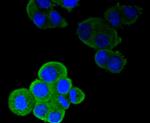
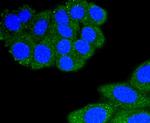
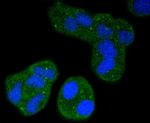
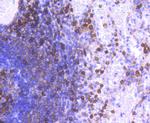
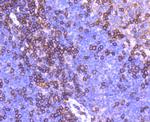
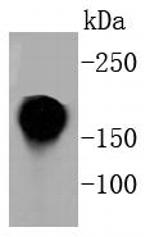
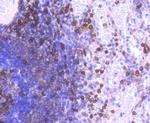
Product Details
MA5-32189
Species Reactivity
Host/Isotype
Expression System
Class
Type
Clone
Immunogen
Conjugate
Form
Concentration
Purification
Storage buffer
Contains
Storage conditions
Shipping conditions
RRID
Product Specific Information
Recombinant rabbit monoclonal antibodies are produced using in vitro expression systems. The expression systems are developed by cloning in the specific antibody DNA sequences from immunoreactive rabbits. Then, individual clones are screened to select the best candidates for production. The advantages of using recombinant rabbit monoclonal antibodies include: better specificity and sensitivity, lot-to-lot consistency, animal origin-free formulations, and broader immunoreactivity to diverse targets due to larger rabbit immune repertoire.
Target Information
CD11a (LFA-1 alpha, ITGAL) together with CD18 constitute leukocyte function-associated antigen 1 (LFA-1), the alphaLbeta2 integrin. CD11a is implicated in activation of LFA-1 complex. CD11a plays a central role in leukocyte intercellular adhesion through interactions with its ligands, ICAMs 1-3 (intercellular adhesion molecules 1 through 3), and also functions in lymphocyte costimulatory signaling. CD11a is expressed on the plasma membrane of leukocytes in a low-affinity conformation. Cell stimulation by chemokines or other signals leads to induction the high-affinity conformation, which supports tight binding of CD11a to its ligands, the intercellular adhesion molecules ICAM-1, -2, -3. CD11a is thus involved in interaction of various immune cells and in their tissue-specific settlement, but participates also in control of cell differentiation and proliferation and of T-cell effector functions. Blocking of CD11a function by specific antibodies or small molecules has become an important therapeutic approach in treatment of multiple inflammatory diseases. For example, humanized anti- CD11a antibody Efalizumab (Raptiva) is being used to interfere with T cell migration to sites of inflammation, binding of cholesterol-lowering drug simvastatin to CD11a allosteric site leads to immunomodulation and increase in lymphocytic cholinergic activity. Two transcript variants encoding different isoforms of CD11a have been found. Diseases associated with CD11a dysfunction include benign cephalic histiocytosis and leukocyte adhesion deficiency.
For Research Use Only. Not for use in diagnostic procedures. Not for resale without express authorization.
References (0)
Bioinformatics
Protein Aliases: antigen CD11A (p180); antigen CD11A (p180), lymphocyte function-associated antigen 1, alpha polypeptide; antigen CD11A p180; CD11 antigen-like family member A; CD11a; integrin alpha L; Integrin alpha-L; integrin alphaL; integrin gene promoter; integrin, alpha L (antigen CD11A (p180), lymphocyte function-associated antigen 1; alpha polypeptide); Leukocyte adhesion glycoprotein LFA-1 alpha chain; Leukocyte function-associated molecule 1 alpha chain; LFA-1 alpha; LFA-1A; lymphocyte function-associated antigen 1; lymphocyte function-associated antigen 1, alpha polypeptide
Gene Aliases: CD11A; ITGAL; LFA-1; LFA1A
UniProt ID: (Human) P20701
Entrez Gene ID: (Human) 3683

Performance Guarantee
If an Invitrogen™ antibody doesn't perform as described on our website or datasheet,we'll replace the product at no cost to you, or provide you with a credit for a future purchase.*
Learn more
We're here to help
Get expert recommendations for common problems or connect directly with an on staff expert for technical assistance related to applications, equipment and general product use.
Contact tech support
